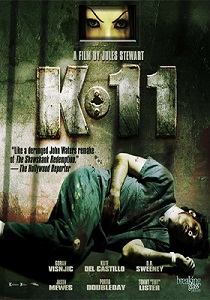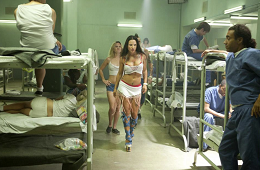 A jumbled and poorly arranged hodge-podge of bad ideas, even worse decisions, and absolutely deplorable execution, K-11, out now on DVD and Blu-ray, is less of a movie and more of a clinic on how well-meaning art can go astray.
A jumbled and poorly arranged hodge-podge of bad ideas, even worse decisions, and absolutely deplorable execution, K-11, out now on DVD and Blu-ray, is less of a movie and more of a clinic on how well-meaning art can go astray.
The film’s director is Jules Stewart, a veteran script supervisor with over twenty five years and dozens of big-name Hollywood films on her resume. Yet working in this capacity clearly didn’t put Ms. Stewart in any position to take on directing duties: K-11 is proof enough for anyone looking to dispute that fact. Indeed, although working on the set of XXX, Little Giants, and Flubber probably gave her an idea of how one might direct, this didn’t serve the end result any more than if an anesthesiologist assumed surgery duties after 20-plus years on the job.
“I’ve seen it done hundreds of times. No sweat.”
A valiant effort, to be sure, yet K-11, were it that random patient, would be dead on the table. It stars Goran Visnjic as Raymond Saxx, Jr., who starts the movie in a drug-addled fog so thick that he can’t help but to drift in and out of consciousness throughout his booking. Before he can get to the lock-up’s detox ward, Raymond is “bought” by the head guard of a sexual deviancy prison ward, K-11. D.B. Sweeney plays this nefarious guard, Lt. Johnson, who runs the K-11 ward with the help of a few trusted inmates who also regulate drugs and discipline within the prison unit. This is essentially the set-up of the entire picture, for it rarely leaves this hellish penal setting, and seems content to simply shock, terrify, and disgust its fish-out-of-water lead (and by extension, the audience as well).
 The “Alice” within this sub-human Wonderland, Raymond slowly emerges from his stupor to find that he’s subject to the laws and discipline of the ward’s Queen Bee, Mousey (Kate del Castillo), a pre-op tranny with an amazing rack, fists of steel, and a short goddamned temper. The movie doesn’t provide a lot in the way of an explanation for this strange K-11 ward, nor does it offer much to illuminate why Raymond is even in jail until about halfway through the picture, when the bewildering madness of matters starts to overwhelm a viewer. Intriguing for the first five minutes or so, the practical logic of everyday life intrudes on the fragile patchwork of this movie’s plot at practically every turn, so much so that by the time K-11 starts filling its audience in on the details of Raymond’s situation, any investment in the characters or their universe is lost.
The “Alice” within this sub-human Wonderland, Raymond slowly emerges from his stupor to find that he’s subject to the laws and discipline of the ward’s Queen Bee, Mousey (Kate del Castillo), a pre-op tranny with an amazing rack, fists of steel, and a short goddamned temper. The movie doesn’t provide a lot in the way of an explanation for this strange K-11 ward, nor does it offer much to illuminate why Raymond is even in jail until about halfway through the picture, when the bewildering madness of matters starts to overwhelm a viewer. Intriguing for the first five minutes or so, the practical logic of everyday life intrudes on the fragile patchwork of this movie’s plot at practically every turn, so much so that by the time K-11 starts filling its audience in on the details of Raymond’s situation, any investment in the characters or their universe is lost.
Although the film makes a passing attempt at showing how Lt. Johnson might have surreptitiously sneaked Raymond into the ward via a phony wristband and name, it never explained why the justice department, U.S. Marshals, or the L.A. County Sheriff’s Department didn’t completely lose their shit when a high-profile murder suspect went missing. Why wasn’t Raymond arraigned? Was he given an opportunity to post bond? Was the A.C.L.U. aware that the Los Angeles Prison system was segregating prison populations based on sexual orientation?
Meh…it doesn’t really matter. This movie isn’t worth even that much consideration. Despite working with a script that makes absolutely no sense, which is amazing in and of itself considering the director’s primary knowledge base, the film doesn’t even seem brave enough to cast transgender actors in the parts that are written for just such thespians. Apparently content to make a film about a hardcore gay and transgender prison ward without making any kind of an attempt to explore what something like that might actually look like, this film is trying to have its cake and eat it too.
 And that’s the biggest problem with Stewart’s picture, which has the distinction of being both deplorable AND horribly misguided. By spinning this yarn about a Kafka-esque descent into the darkest corners of the American penal system, and using transgender characters as the veritable boogey-men of its tale, K-11 is perpetuating a long-standing Hollywood stereotype about the LGBT community. The prison ward is stocked with homosexual and transgender inmates, implying that they represent a level of deviancy that needs to be quarantined and essentially forgotten about. Making matters worse, the K-11 ward is a mixed bag of non-violent cross-dressers and hardcore child molesters, suggesting a level of parity between the two: an implication that’s never really challenged throughout the picture.
And that’s the biggest problem with Stewart’s picture, which has the distinction of being both deplorable AND horribly misguided. By spinning this yarn about a Kafka-esque descent into the darkest corners of the American penal system, and using transgender characters as the veritable boogey-men of its tale, K-11 is perpetuating a long-standing Hollywood stereotype about the LGBT community. The prison ward is stocked with homosexual and transgender inmates, implying that they represent a level of deviancy that needs to be quarantined and essentially forgotten about. Making matters worse, the K-11 ward is a mixed bag of non-violent cross-dressers and hardcore child molesters, suggesting a level of parity between the two: an implication that’s never really challenged throughout the picture.
To make much more of a point of this unavoidably sticky problem would be more of a credit to this film than it deserves, for it would likely just garner K-11 a modicum of attention that its miniscule theatrical release most certainly won’t. A bad movie all by itself, it doesn’t help that the acting is so laughably over the top that one gets the sense that director Jules Stewart only has two directing points at her disposal: bigger and louder. Seriously, the whole movie feels like one of those badly managed high school theatricals where it’s considered a victory if everyone at the back of the gymnasium can hear the actors.
Avoid this one at all costs.





Comments on this entry are closed.